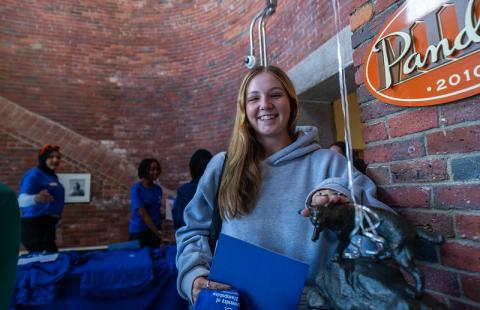Navigate the biological and social elements of human behavior through research and hands-on learning
What is psychology?
Psychology is the scientific study of behavior and mental processes — essentially what we do, and everything involved in thinking. Contemporary psychology largely utilizes the biopsychosocial approach to understand everyday behaviors like eating, sleeping and exercising, as well as atypical behaviors such as addiction, depression and other psychological disorders. In addition to developing listening skills and empathy, psychology students develop skills in scientific oral and written communication, empirical thinking and data analysis, which are in-demand in many industries.
Why study psychology at UNH Manchester?
Guided by faculty who are experts in their disciplines, psychology students at UNH Manchester develop a broad background in the field — including perceptual, counseling and developmental psychology. Research is central to the program, offering students hands-on learning opportunities in sensation and visual perception, child psychology, neuropsychology and community-based research. Manchester is the state’s business hub, and UNH has partnered with many local organizations that offer real-world opportunities to psychology majors. This highly interdisciplinary program prepares students for graduate study in psychology-related fields as well as careers in research, social work, behavioral health, education and more.
Potential careers
- Alcohol and drug counselor
- Behavior technician
- Guidance counselor
- Marriage and family therapist
- Mental health counselor
- Psychologist
- Psychology teacher
- Public relations manager
- Recreational therapist
- Social worker
Curriculum & Requirements
Psychology is the scientific study of behavior and mental processes. The UNH Manchester psychology program provides students with a broad background in psychology, introducing them to both the experimental and clinical perspectives in the field.
The psychology program, through its independent study and internship programs, offers opportunities for participation in cooperating New Hampshire mental health, human services, and rehabilitation facilities. Students have worked in hospitals, halfway houses, mental health centers, and other agencies. The department also invites guest speakers to discuss important issues in the field and sponsors a Psychology/Neuropsychology Club.
Psychology graduates find employment as trained research assistants, mental health aides in a wide variety of human services agencies, social welfare caseworkers, teachers in special education programs, and professionals in government, business, and industry. It is normally expected that students who wish to do professional clinical work will need to pursue graduate training at the master's or doctoral level.
For more information contact, the UNH Manchester Office of Admissions at (603) 641-4150.
This degree plan is a sample and does not reflect the impact of transfer credit or current course offerings. UNH Manchester undergraduate students will develop individual academic plans with their professional advisor during the first year at UNH.
Sample Course Sequence
| First Year | ||
|---|---|---|
| Fall | Credits | |
| UMST 401 or UMST 402 | First Year Seminar or Transfer Seminar | 1-2 |
| ENGL 401 | First-Year Writing | 4 |
| PSYC 401 | Introduction to Psychology | 4 |
| Discovery Course | 4 | |
| Discovery Course | 4 | |
| Credits | 17-18 | |
| Spring | ||
| PSYC 402 | Statistics in Psychology | 4 |
| Discovery Course | 4 | |
| Elective | 4 | |
| Elective | 4 | |
| Credits | 16 | |
| Second Year | ||
| Fall | ||
| Foreign Language | 4 | |
| PSYC 502 | Research Methods in Psychology | 4 |
| Breadth (500-level) course | 4 | |
| Discovery Course | 4 | |
| Credits | 16 | |
| Spring | ||
| Foreign Language | 4 | |
| Breadth (500-level) course | 4 | |
| Breadth (500-level) course | 4 | |
| Discovery Course | 4 | |
| Credits | 16 | |
| Third Year | ||
| Fall | ||
| Breadth (500-level) course | 4 | |
| Depth (700-level) course | 4 | |
| Discovery Course | 4 | |
| Elective | 4 | |
| Credits | 16 | |
| Spring | ||
| Depth (700-level) course | 4 | |
| Discovery Course | 4 | |
| Elective | 4 | |
| Elective | 4 | |
| Credits | 16 | |
| Fourth Year | ||
| Fall | ||
| Depth (700-level) course | 4 | |
| Discovery Course | 4 | |
| Elective | 4 | |
| Elective | 4 | |
| Credits | 16 | |
| Spring | ||
| Depth (700-level) course | 4 | |
| Capstone course | 4 | |
| Discovery Course | 4 | |
| Elective | 4 | |
| Credits | 16 | |
| Total Credits | 129-130 | |
Degree Requirements
All Major, Option and Elective Requirements as indicated.
*Major GPA requirements as indicated.
Major Requirements
Students majoring in psychology must complete a minimum of 128 credits, satisfy the University's Discovery Program and foreign language requirements, and complete 44 credits with a minimum of C- in each course and a 2.0 overall grade-point average in all major requirements.
Transfer students who elect to major in psychology must complete at least 24 credits in the program at UNH/UNH Manchester to qualify for the degree in psychology. Transfer students must earn a total of 44 approved credits for completion of the psychology major. The department's academic advisors will determine the distribution of these credits. Transfer students should note that courses are allotted only the number of credits granted by the original institution (after adjustments for semester-hour equivalents). Thus, students transferring from an institution at which courses carry less than four credits each must make up for any credit deficit created by acceptance of transfer credits into the psychology major. Only courses taken in a psychology department can be transferred into the psychology major. Of the four 700-level courses required for the major, at least three must be taken at UNH.
The courses listed below are offered on the UNH Manchester and/or Durham campuses; specific course selections should be discussed with the advisor. Exceptions to the requirements for the major require a petition to the department.
| Code | Title | Credits |
|---|---|---|
| Core Courses | ||
| PSYC 401 | Introduction to Psychology | 4 |
| PSYC 402 | Statistics in Psychology | 4 |
| PSYC 502 | Research Methods in Psychology | 4 |
| Breadth (500-level) courses | ||
| Select two of the following courses from Group I: | 8 | |
PSYC 511 | Sensation and Perception | |
PSYC 512 | Psychology of Primates | |
PSYC 513 | Cognitive Psychology | |
PSYC 521 | Behavior Analysis | |
PSYC 522 | Behaviorism | |
PSYC 531 | Psychobiology | |
| Select two of the following courses from Group II: | 8 | |
PSYC 552 | Social Psychology | |
PSYC 553 | Personality | |
PSYC 561 | Psychopathology | |
PSYC 571 | Pioneers of Psychology | |
PSYC 581 | Child Development | |
| Depth (700-level) courses | ||
| Select two of the following courses from Group I: | 8 | |
PSYC 705 | Tests and Measurement 1 | |
PSYC 710 | Visual Perception | |
PSYC 713 | Psychology of Consciousness | |
PSYC 720 | Animal Cognition | |
PSYC 722 | Behaviorism, Culture, and Contemporary Society | |
PSYC 731 | Brain and Behavior | |
PSYC 733 | Drugs and Behavior | |
PSYC 735 | Neurobiology of Mood Disorders | |
PSYC 736 | Attention Disorders | |
PSYC 741W | Special Topics | |
| Select two of the following courses from Group II: | 8 | |
PSYC 705 | Tests and Measurement 1 | |
PSYC 755 | Psychology and Law | |
PSYC 756 | Psychology of Crime and Justice | |
PSYC 757 | Psychology of Happiness | |
PSYC 758 | Health Psychology | |
PSYC 762 | Counseling | |
PSYC 785 | Social Development | |
PSYC 791W | Special Topics | |
PSYC 793 | Internship | |
| Discovery Capstone | ||
| See below options | ||
| Total Credits | 44 | |
- 1
May be substituted for a Group I or Group II course, but they may not both be used to fill the same group.
Discovery program requirements
- Major department courses may not be used to satisfy Discovery category requirements except for PSYC 402 Statistics in Psychology, which may be used to satisfy the Quantitative Reasoning (QR) Discovery requirement and the major requirement.
- PSYC 401 cannot be used to fulfill a Social Science.
- PSYC 571 cannot be used to fulfill a Historical Perspective.
- In the case that Psychology is a second major, major courses can be counted toward the Discovery requirements.
Discovery Capstone
The Discovery Program capstone requirement, taken during the senior year, may be fulfilled by completing one of the following options:
- PSYC 793 Internship: This will count towards fulfilling the capstone and a group II 700-level psychology course. By taking PSYC 793 Internship, the capstone will be considered fulfilled.
- PSYC 795 Independent Study: Students can designate a 4 credit independent study as their capstone experience. Students should also register for PSYC 798 Capstone, a 0 credit course to reflect that the capstone experience is fulfilled.
- One 700-level course designated as capstone. A capstone designated 700-level course will count towards fulfilling the capstone and a 700-level course. Students will register for PSYC 798 Capstone, a 0 credit course to reflect the capstone experience is fulfilled. See guidelines below:
- You may take any eligible 700-level Psychology course in your senior year (90+ completed credits) for Capstone credit.
- Ask your professor about the possibility of taking the course for Capstone credit. Remember that your professor is not obligated to designate a course for Capstone credit. Please be respectful in approaching your professor, and if the answer is no, please accept this decision.
- Meet and discuss with your professor what you will be doing to constitute your Capstone experience. In some cases, it will be an extra assignment; in others it will involve the expansion of existing class work. Your professor will use his/her professional discretion to determine what constitutes as your Capstone experience.
- If approved, you will register for PSYC 798 Capstone in addition to the 700-level course.
The psychology department does not accept other departments' statistic courses toward the psychology major. Students who have taken a statistics course other than PSYC 402 Statistics in Psychology must pass a competency exam in order to declare the major and/or register for PSYC 402 Statistics in Psychology.
Students who plan to transfer to Durham should consult with their advisor.
Program Learning Outcomes
- Demonstrate fundamental knowledge and comprehension of the major concepts, theoretical perspectives, historical trends, and empirical findings in psychology.
- Understand basic research methods in psychology including design, data analysis, and interpretation; and utilize this knowledge to conduct their own psychological research, with an appreciation of the ethical issues involved in human and non-human research.
- Engage in scientific reasoning and problem solving so that they can evaluate the quality and implications of scientific research.
- Write empirical research reports and literature reviews in American Psychological Association style and present findings from scientific research.
Explore Program Details
-
Associate ProfessorChair, Department of Life SciencesEmail: Alison.Paglia@unh.eduPhone: (603) 641-4103
-
Associate ProfessorInterim Chair of Life SciencesEmail: Daniel.Seichepine@unh.eduPhone: (603) 641-4134
Because of the growth and breadth of our program, we have four lab spaces designed to meet your unique research and experimentation needs.
How do young children respond emotionally when faced with unusual or surprising experiences? This lab was recently designed to answer these kinds of questions. One room serves as a student work area and greeting room for welcoming families, complete with child-friendly toys. This is adjoined by an observation room complete with a one-way mirror and audio-visual recording equipment, allowing students to evaluate child emotional experiences through observational, subjective and physiological measures.
Examine the brain and its relation to the emotional, physical, cognitive and social behaviors in people. You’ll delve into the long-term effects of brain injuries and neurological diseases, perform brain dissections to study the physiology of pathological states and use clinical neuropsychology tools to evaluate IQ, learning and memory.
Each year students conduct community-based research projects with local partners like the YWCA, New Hampshire Hospice and Palliative Care Organization, Boys & Girls Club and more. The Paglia Research Lab is entirely devoted to this research, giving you the privacy you need to conduct phone interviews, securely store focus group, interview and survey data, and prepare your findings.
This multi-purpose, two-room teaching and research laboratory gives upper level students hands-on experience in visual perception. You’ll conduct research individually, in teams and with faculty, using industry tools like a Wheatstone stereoscope to project 3D images, pump-based chair for subject positioning and computer-controlled LED-based colorimeter for experiments in color-naming and color-matching.
Our psychology program gives you the scientific skills to answer questions about human behavior and physiology, as well as the communication and critical thinking skills that stand out to employers in any industry.
Psychology is a highly interdisciplinary field that opens doors to limitless career and graduate education opportunities, including areas like education, human services, research, business and more. The Bureau of Labor Statistics projects positive growth in many related professions between 2012 and 2024, translating to vast possibilities for your future.
| Job Title | Job Growth | Median Salary |
| Guidance Counselor | 8% | $53,660 |
| Marriage and Family Therapist | 19% | $43,190 |
| Mental Health Counselor | 29% | $40,080 |
| Psychologist | 19% | $72,580 |
| Psychology Teacher, Postsecondary | 13% | $72,470 |
| Public Relations Manager | 7% | $104,140 |
| Recreational Therapist | 12% | $45,890 |
| Social Worker | 12% | $45,900 |
| Sociologist | -1% | $73,760 |
| Substance Abuse and Behavioral Disorder Counselor | 22% | $39,980 |
Add a unique perspective on society and human behavior to your degree with our psychology minor, giving you the skills and credential that will set you apart to potential employers.
In partnership with the New Hampshire community colleges below, we've developed a pathway to show you which courses at your community college will transfer into UNH Manchester's psychology program.








